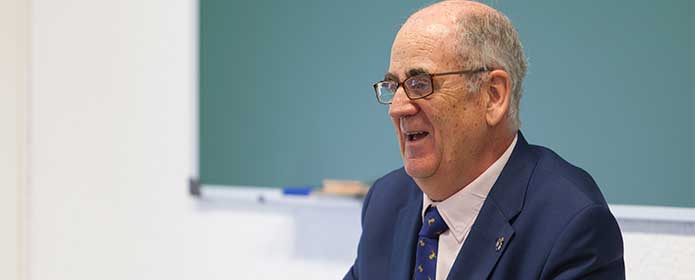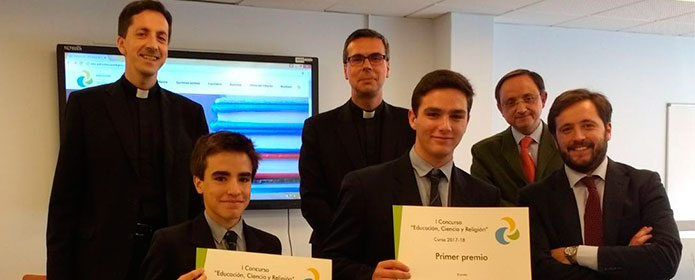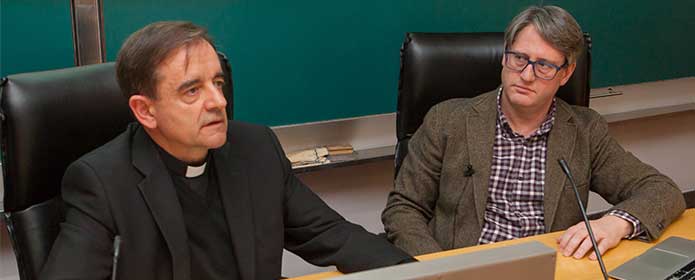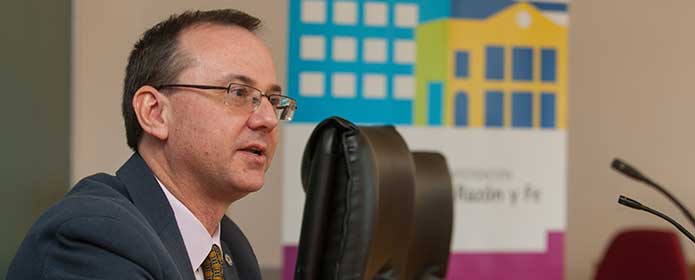Juan Arana: "Teaching routine tasks is pointless because they will be increasingly taken over by machines and robots".
The Full Professor of Philosophy of the University of Seville gives the seminar of the 'group Science, Reason and Faith' (CRYF) on the existing problem educational

"Teaching to perform routine tasks, both simple and complicated, makes no sense, since these tasks will be increasingly and unstoppably taken over by machines and robots". This was stated by Juan Arana, Full Professor of Philosophy of the University of Seville and member of the Royal Academy of Moral and Political Sciences, at the seminar "Some utopian considerations on the problem educational", organized by the 'group Science, Reason and Faith' of the University of Navarra.
As he pointed out in his speech, for some time now there has been a process of scientific-technological globalization that has substantially modified the conditions of the labor market: "The massive use of artificial intelligence and robotics will make it possible for machines to take on a large part of the tasks that are still performed by human beings today". In this sense, he indicated that "it is advisable to provide a multipurpose Education that enables a rapid and non-traumatic integration of human beings in different professional environments. There is nothing like a high-level generalist Education to provide emotional stability and vital balance".
Faced with this future panorama, and with the goal of "carrying out an analysis staff of the process educational, in relation to labor insertion and promotion", Arana has put forward some considerations, the fruit of a long pedagogical experience: "The most utopian part of my proposal consists of encouraging that the peak phase of the self-training effort and the assumption of work commitments be postponed to the decade of the 30s to the 40s, and the period of progressive disengagement from work occur only from the 60s, reaching the 70s for an estimable sector of the population". He also added that "this should not be achieved by means of prohibitions and restrictive legislation, but through positive reinforcements, offering young people an exciting program of socially profitable tasks, before confronting them with the responsibility of the productive work . It is a question of becoming aware that the productive work is no longer indispensable to the same extent as before for the survival of humanity, because thanks to science and technology it is preferable to solve most of the routine tasks in another way, while other activities are only within the reach of men and women and will be increasingly necessary to preserve the future and even the very survival of the human race".
The Full Professor has maintained that "in the professional careers of the future, adaptability to new environments and the aptitude to assume new tasks will be the rule and not the exception", so that "there will be no choice but to make some in-depth reforms and the first is undoubtedly the educationalsystem". "The tasks of social relevance that I utopically propose to promote and reward during a phase prior to employment rate are training and procreation. Achieving that by the age of 30 most of the members of society have become citizens with a non-frivolous and non-superficial knowledge of man, nature and society, would solve a portion of social problems. The utopia I propose looks to the future and not to the past," he said.
Juan Arana was the speaker of the IV Mariano Artigas Memorial Lecture, held at the University of Navarra on October 17. He is Full Professor of Philosophy of the University of Seville, where he belongs to the group of research 'Philosophy and Contemporary Culture' of the department of Philosophy and Logic and Philosophy of Science. Member of the Royal Academy of Moral and Political Sciences, he is professor partner of doctorate at the School of Philosophy and Letters of the University of Navarra and member partner of 'group Science, Reason and Faith'. His research work has focused on the Philosophy of nature and knowledge, with special interest in the relationship between modernity and religion.



